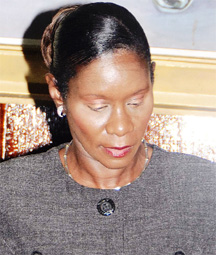One of the victims in the recently dismissed hu-man trafficking cases against shop owner Ann Marie Carter has called upon the authorities to re-open the case and give her a chance to testify against the woman whom she alleges brutalized her.
The now 18-year-old victim and mother of a young baby boy recently told the Stabroek News that she was never informed by the authorities that she was needed in court to testify. The young woman, who has had a very difficult life and whose story was detailed in these pages recently, said she was awaiting information from the authorities and was shocked to hear that the matter had been dismissed against the woman without her being given a chance to testify.
“I really need justice because I can’t see them just finish my case just so without nothing… I don’t know how the ministry is working like that,” the young woman told this newspaper in a recent interview.

Five human trafficking charges were recently dismissed against Carter by Magistrate Dylon Bess who had ruled that insufficient evidence had been presented against the woman in court.
President of the Guyana Women Miners Organisation (GWMO) Simona Broomes had told this newspaper that some of the victims did not attend court and others did not return to complete giving evidence, and had placed the blame for this at the feet of the Ministry of Human Services and Social Security and its Child Protection Agency as well as the Guyana Police Force.
She had questioned how the Guyana government could effectively tackle the TIP problem when the victims, most of whom are in state care or have been placed in foster care, are not taken to court to testify against the accused.
The Stabroek News contacted Minister of Human Services & Social Security Jennifer Webster early last week on this issue asking that she respond to claims that the Child Protection Agency and the TIP unit in her ministry had failed to ensure that the victims attend court. The minister, who was contacted via email, was also asked about a claim by the 18-year-old victim that she had met an employee in the unit (whose first name was provided) and she had inquired about the case. The employee had indicated she was not needed in court at that time and that she would be contacted when she was. The call never came even though, according to the young woman, the authorities know where she lives.

While Minister Webster responded via email indicating that she had received the email and that she would respond to the questions shortly there has been no correspondence from her since.
However, in her presentation on the 2014 budget last Monday in the National Assembly, Webster said that it is the police who are responsible for informing witnesses or alleged victims of a scheduled court appearance while her ministry is primarily responsible for the support of the alleged victims.
She did note, however, that communication is a key element in building relationships for effective inter-agency collaboration and it is in this regard that the roles and responsibilities of the participating agencies must be understood.
Broomes had written a letter to the office of the Director of Public Prosecution (DPP) Shalimar Ali-Hack in which she had asked about the status of the five matters. In relation to the victim who is now demanding justice, Ali-Hack in a March 4 letter (two days after Carter was freed), had stated that she had failed to attend court on numerous occasions and as a result the magistrate dismissed the charge for want of prosecution. The DPP had also informed her that the Office of Professional Responsibility (OPR) found that checks were made for the victim at her last known address in Parika but her exact whereabouts were unknown – “Information received that the VC returned to the ‘Backdam.’”
“Further, the summons in respect of the VC, which was sent to her address by registered mail, was not returned to sender; thereby it could be inferred that the summons was delivered to the VC or someone at her address,” the DPP wrote.
The victim was shocked to read what the DPP said as at no time did she return to the Parika address and that it was the Child Care and Protection Agency which had placed her to be fostered at the home where she still lives.
Officials from the Child Care and Protection Agency, she said, knew where she was, they visited her and had several numbers for her. But no one called.
‘Drink and smoke’
The teen mother still has difficulty when she recalls her experiences at the shop. She alleges that she was forced to smoke marijuana and drink alcohol and that on the final night at the shop in the Puruni Backdam she was in a drugged state when she was pulled out of bed, beaten, and told she had to prostitute herself to repay the money used to transport her into the interior.
It was after that
experience which left one of her eyes swollen, she managed to leave the shop the next morning with the help of a man.
Owing to the beatings and the fact that she was kept almost a captive for the two weeks she was at the location, the teen reported the assaults to the police and later to the Ministry of Human Services & Social Security.
Carter allegedly took the teen into the interior even as the police were reportedly looking for her in relation to four counts of alleged trafficking.
The teen claims that she had met the woman at Parika and was told that she was being taken into the interior to sell in a shop. But upon arrival she was informed that she had to “pick fare” (prostitute). She refused and was allegedly assaulted repeatedly in an attempt to force her to sleep with customers.
When the beatings failed she alleged that she was forced to smoke marijuana and drink alcohol.
“She put me to smoke weed and cigarette with rum, all kind rum you could think about she give me, trying to drug me out. I didn’t take it at first but after I use to smoke and drink because I didn’t have a choice,” the teenager said.
The Sunday Stabroek had carried a detailed story on the struggles the young woman had experienced in her short life. She was told that she was abandoned by her mother at the age of three months and she remembers spending her first few years in a children’s home. She has lived on the streets and spent time at the New Opportunity Corps (NOC), a time she said, which was the best in her life.
The man who rescued her from her captor is now her partner, who from all accounts infected her with HIV. In fact, the Child Care & Protection Agency placed her in the home of the mother of her partner to be fostered, and it was there they became involved. Nevertheless she is determined to stick it out with him and provide a home for her son, since it is something she never had.
As she reminisces on her life she looks down at her days-old baby and wonders aloud what life he will have because both she and the father are HIV positive.
But even as she thinks about this she feels that the authorities should ensure that her alleged offender pays for what she did to her and other young girls. “Now I have my son and it really affecting me…I need justice, I need to move on this is not right,” she said almost in tears.
“I feel bad, I want justice because I can’t see dem dismiss the case and no one is not calling me. I called several times to find out about my case and I not hearing nothing,” the teenager said.
Appeal
Meantime, Candacy Abigail Anderson and her reputed husband Wesley Harte, who were on August 13, 2013 sentenced to five years in prison by Magistrate Adele Nagamotoo in the New Amsterdam Magistrate’s Court after being found guilty of human trafficking, were released on $350,000 bail each by Chief Justice Ian Chang less than two months after the sentenced was imposed after filing separate appeals.
Broomes had informed this newspaper that Anderson is back in the Oko Backdam, Region 7, operating her shop.
According to the affidavit in support of the application of bail and sworn to by Anderson’s sister Rennetann Clement and filed by the office of attorney-at-law Glen Hanoman, the convicted woman said she had been advised by her lawyer that the charge was bad in law.
She was also advised that the statement of offence as contained in the information is “patently erroneous in that it fails to specify the correct provision under which the accused was charged as Section 3 contains several offences.” Further, her lawyer said that the prosecution failed to adduce any evidence capable of giving rise to the allegation of fraud or exploitation as alleged in the particulars of the charge. She said she was also denied the right to a fair trial and due process of law as guaranteed under Article 144 of the Constitution when Magistrate Nagamotoo failed to reasonably afford her an opportunity to have her counsel present to lead a defence to cross examine the prosecution witnesses, or for her to make a submission of no case to answer, or to address the court in mitigation and on sentencing guidelines if necessary.
It was on those grounds that she and her husband appealed the sentence and were granted bail as the appeal is pending.




